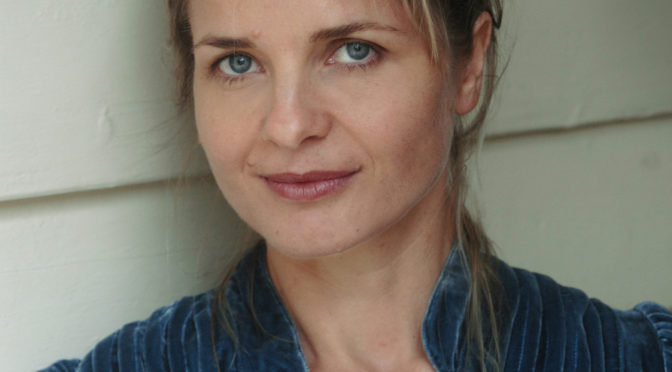The Stella Interview: Sofie Laguna

The Stella Prize chats with Sofie Laguna, author of The Eye of the Sheep
Stella: Who is your favourite woman?
Sofie: One of my favourite women is Dolly Parton. Mum and Dad used to play her music in our big red Ford F100 truck as we drove to our farm in the country. I still love her – she is generous, warm-hearted, talented, funny, self-deprecating, ambitious and honest, and I love it when she sings bluegrass. I saw her perform recently and was transfixed. It was as if she held my childhood in her voice. Dolly Parton seems kind to me. And I love her friends – Emmylou Harris, Lucinda Williams, Patty Griffin and Bonnie Raitt – all wonderful singer–songwriters.
Stella: Which writers have shaped your work?
Sofie: I think everything is shaping my work; every film, every song, every book and poem that I read. Relationships are shaping my work, suffering and struggle are shaping my work, nature, people – every aspect of daily life. It all goes through some complex inner filtering process without me having to think about it or control it – then it comes out through the work in surprising and unexpected ways.
But if I think very specifically about books and ways they might have contributed (I always think of the book as being the inspiration rather than the writer. I don’t know if that’s wrong or right, but it’s as if the book is a separate thing with its own soul) it would be, when I was younger, The Secret Garden by Frances Hodgson Burnett, I Capture the Castle by Dodie Smith, and Anne of Green Gables by Lucy Maud Montgomery. Then, when I was older, Jeanette Winterson’s Oranges Are Not the Only Fruit, Arundhati Roy’s The God of Small Things and Helen Garner’s Monkey Grip. And most recently, Marilynne Robinson’s books, Home, Housekeeping and Gilead.
Stella: Is there a writer you aspire to be like?
Sofie: I don’t think I want to be like anyone, but I am inspired by writers who are prolific, gifted and hardworking; notably Margaret Atwood, Anne Tyler and Joyce Carol Oates.
Stella: Why did you become a writer?
Sofie: I was an actor first. It was my dream ever since I was small – to act. I loved becoming other characters with voices different to my own. I loved dressing up and performing and writing plays for my friends. I loved to role-play. Writing was a gear change I made when I was about thirty – the engine remained the same. I have heard writing described as a kind of ‘inner performance’; that makes sense to me. But the writer plays all the characters, and designs the set, and directs everything too. There is more flexibility, greater range and power.
Stella: Do you care what other people think?
Sofie: Not when I am writing. When I am writing I am crafting the piece to the tune of its own demands. There is no audience or reader when I am involved in the making. There are the characters, there is the language, there is the rhythm of the thing. I care about meeting these demands – about getting it right for the book itself. If I were writing music, say, every note would need to be in the right place – not for the entertainment of the listener, but the integrity of the music. And after, when its finished: no, not so much then either.
But I care terribly in just about every other way. It’s a pain! Did I say the wrong thing? Was my tone offensive? Did I behave? Did I get the outfit right? People are challenging, and they can be quite scary. I seem outgoing but in reality I am quite reclusive. I like to be alone a lot. I like trees and quiet roads and I like to listen to music (lots of country music) and drive. Having two little boys can be tricky; I used to drift and dream so much more than I do now. But the writing still happens. Frantically, in snatches, but consistently.
Stella: Do you have a good writing place? Tell us.
Sofie: Since I had children – I have a new baby and a four year old – my writing place is anywhere, and that suits me better than an office. Play centres, parks, the hallway outside the baby’s room, the bed, the car, the café, the zoo. It’s all happening in my unconscious, then I grab the time to get it down as fast as I can before a kid wakes up or asks for something or crawls on me. I like taking the formality out of the business. It takes the pressure off. The work is more distilled, as if it is resisting the pressure of chaos.
Stella: How do you know when a story is finished?
Sofie: It’s as if I have a pair of ‘inner ears’ that can hear the end; as if the story were a song and the last chorus has been sung and it finishes as naturally as that. Do you call that instinct? I’m not sure, but it just goes ‘bump’ – ah, that’s the finish. It’s not something I labour over. Endings are powerful things, so it’s not necessary to work the last words too hard. The fact that it’s the end, and blank space follows the final words, does the work. I try to keep my touch light.




